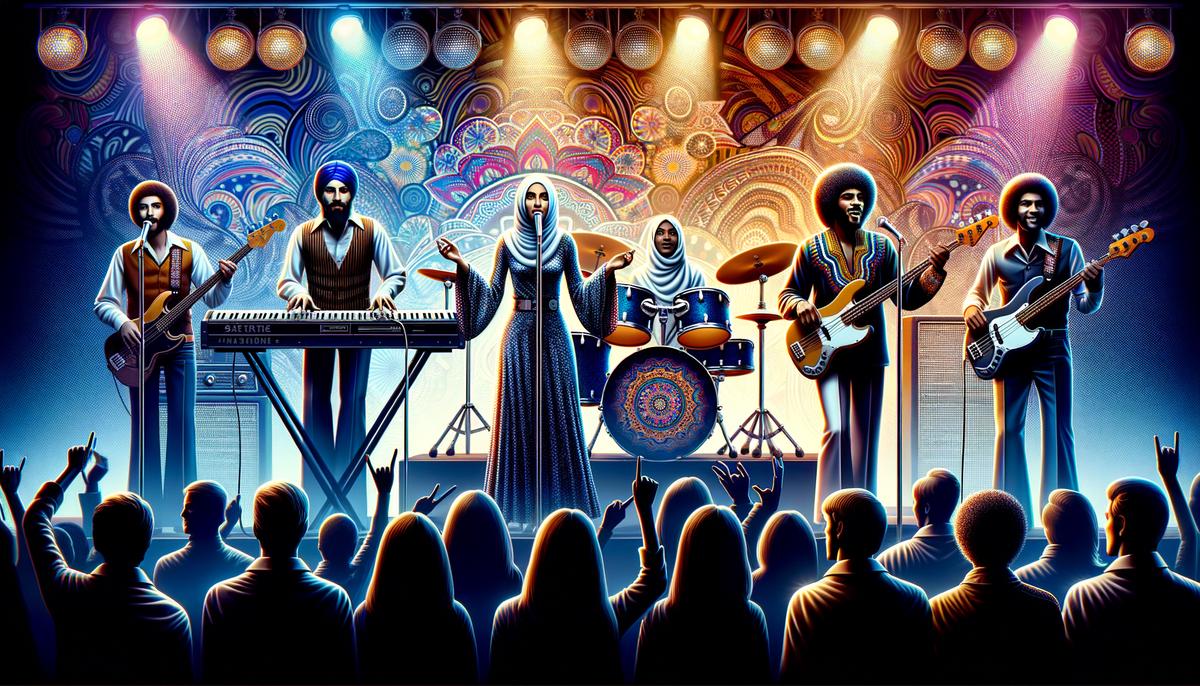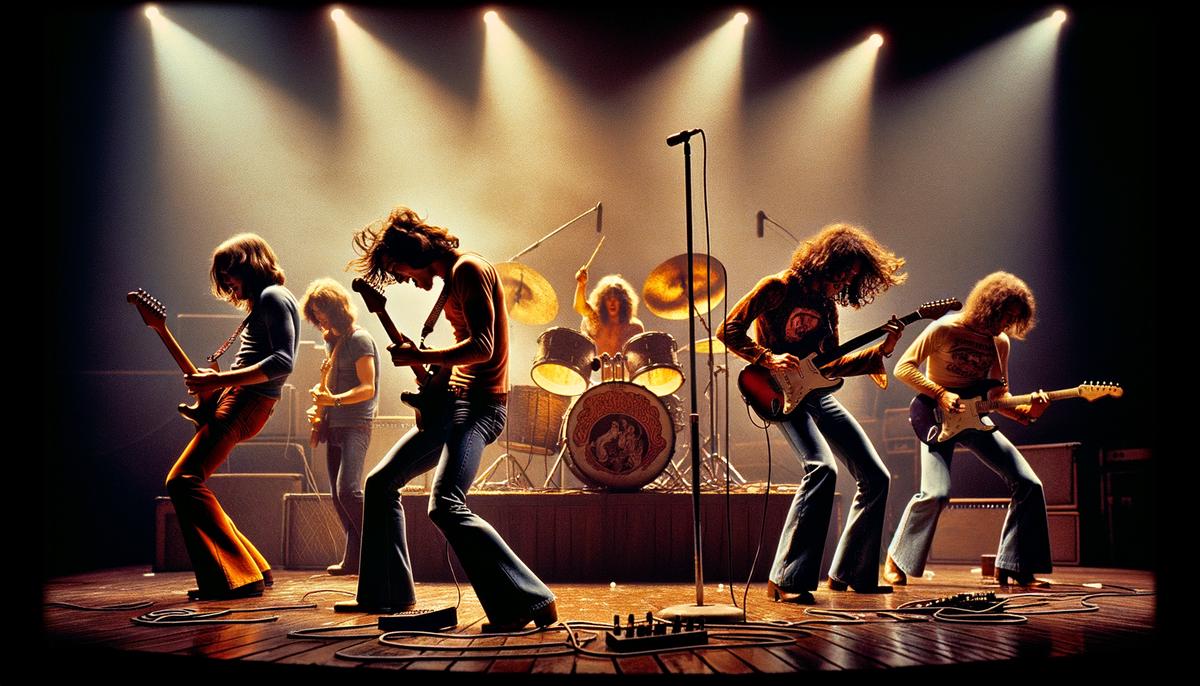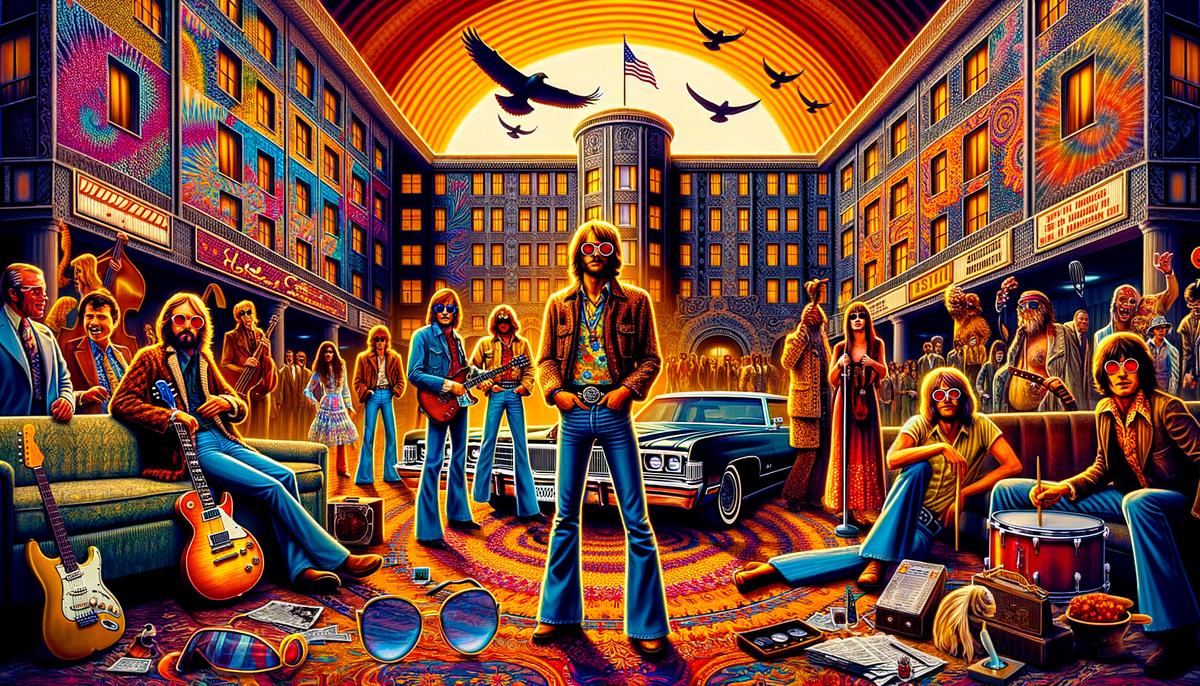The 1970s music landscape was a vibrant tapestry of innovation and emotion, where artists pushed the boundaries of sound and storytelling. This era, marked by a rich array of genres and groundbreaking performances, continues to captivate audiences with its enduring legacy. As we explore the highlights that defined this pivotal decade in music history, we uncover the significant impact these artists had on shaping their careers and influencing generations to come.
Led Zeppelin’s Reign
Led Zeppelin transformed the rock landscape, blending rock, blues, and folk music into a unique sound. With the release of their album "IV," they delivered a standout work that included "Stairway to Heaven"—an artistic statement merging intricate guitar solos with evocative lyrics.1
On stage, Led Zeppelin energized audiences with captivating performances. Jimmy Page's guitar mastery, Robert Plant's versatile vocal range, John Paul Jones' multi-instrumental depth, and John Bonham's powerful drumming drove their innovative sound.
Led Zeppelin fearlessly explored and experimented, incorporating elements of mythology, history, and personal reflection into their music. They shifted effortlessly from hard-rocking anthems like "Whole Lotta Love" to the tender acoustic beauty of "The Rain Song," keeping fans engaged and cementing their status as influential innovators.
Led Zeppelin's legacy remains timeless and impactful, inspiring new generations of musicians and fans. The echoes of their innovation and boldness resonate through today's music, reminding us of their significant mark on music history. Led Zeppelin soared on wings of talent and creativity, shaping the rock landscape with the force of their artistry.

David Bowie’s Chameleon Phase
David Bowie, a 1970s icon, embarked on a remarkable musical journey characterized by creativity and innovation. His ability to reinvent himself musically and visually made him a trailblazer of artistic exploration.
Bowie crafted vivid narratives through his music, transporting listeners into imaginative worlds. The release of "The Rise and Fall of Ziggy Stardust and the Spiders from Mars" introduced fans to an androgynous rock star, showcasing his mastery of personas and theatrical performances.
With albums like "Young Americans," Bowie seamlessly blended soul and pop, creating hits that resonated with diverse audiences.2 His adaptability made each album a cultural statement, not just a collection of singles.
Bowie's collaborations with visionary artists and engaging music videos further solidified his avant-garde status. His distinctive voice, insightful lyrics, and visual appeal went hand-in-hand, offering something unique to the pop world.
Bowie's courage to embrace change and explore the unfamiliar truly made him an icon. In a decade that challenged societal norms, his music acted as both a reflection and a beacon for fans seeking answers or escape. By embracing the eclectic, Bowie carved out his own niche and pushed music into new territories, leaving a legacy fueled by bold innovation and captivating artistry.

Fleetwood Mac’s Emotional Odyssey
Fleetwood Mac's "Rumours" holds audiences in its grasp decades after its release. The album serves as a reflection of the complex relationships within the band, with each song expressing raw emotions that resonate deeply with listeners.
The musical craftsmanship displayed on "Rumours" is remarkable:
- Lindsey Buckingham's inventive guitar playing
- Christine McVie's soulful keys
- John McVie's steadfast bass
- Mick Fleetwood's dynamic drums
- Stevie Nicks' enchanting vocals
Each note and harmony is carefully crafted, ensuring artistic excellence.
"Rumours" bridges the gap between pop and rock, offering an irresistible sonic palette. From the uplifting "Don't Stop" to the hauntingly beautiful "Dreams" and the introspective "Go Your Own Way," the album's diverse mix spans moods and settings, contributing to its timeless appeal.3
The album's creation involved months of meticulous refinement and introspection amidst personal challenges, reflecting the band's commitment to capturing their truth authentically. This artistic integrity endears "Rumours" to its audience.
"Rumours" captures a defining moment in music history, encapsulating the 1970s' spirit of liberation, passion, and complex human connections. It resonates with listeners who find a piece of themselves in its lyrics and melodies, solidifying its place as an enduring classic that transcends generations.

Stevie Wonder’s Harmonic Revolution
Stevie Wonder stands out as a influential figure in the 1970s music industry. His musical ingenuity blended soul, pop, R&B, funk, and jazz into compositions that resonated deeply with listeners worldwide. Wonder redefined and expanded the era's soundscape with innovative techniques and an authentic voice that continues to inspire musicians across genres.
Albums like "Talking Book," "Innervisions," and "Songs in the Key of Life" showcased Wonder's ability to craft memorable hooks packed with energy and sincerity. His lyrical prowess touched on themes of love, social commentary, and calls for unity, speaking to a generation navigating change.
Instrumentally, Wonder experimented with advanced technology, embracing synthesizers and making the Hohner Clavinet synonymous with his style.4 He pioneered electronic music production, influencing aspiring musicians in subsequent decades.
Wonder's activism through music was particularly impactful. With songs like "You Haven't Done Nothin'" and his "What's Going On" medley with Marvin Gaye, he used his platform to inspire change and raise awareness.
Collaborations with renowned artists like Paul McCartney and Michael Jackson further elevated the musical landscape, reflecting Wonder's willingness to generously share his talent.
Stevie Wonder accomplished the rare feat of transforming music beyond entertainment into a realm brimming with life's complexities, emotional depths, and joy. He captivated millions while influencing industry paradigms, making the 1970s music scene unimaginable without his significant contributions woven throughout.

Queen’s Theatrical Flamboyance
Mercury's four-octave vocal range captured the depth of human experience, from seductive ballads to powerful anthems. His dynamic stage presence made every Queen concert a memorable event.
Queen crossed genres, from the hard-rocking "Stone Cold Crazy" to the rockabilly "Crazy Little Thing Called Love" and the operatic "Bohemian Rhapsody." They combined rock with opera, jazz, and pop, showcasing creativity that engaged fans and critics alike.
Brian May's multi-tracked guitar harmonies added a unique quality to their sound. Roger Taylor's drums and John Deacon's bass drove the music with precision and finesse, revealing layers of intricacy.
"Bohemian Rhapsody" showcases their studio artistry, with multiple harmonies and an orchestral quality that expanded the boundaries of rock music. The song, which topped the UK Singles Chart for nine weeks1, is considered one of the greatest rock songs of all time.
Each member brought diverse influences, from classical to heavy metal, elevating their music to a widely appealing level. Their lyrics explored love, life, and the universe, resonating with millions.
Queen's legacy is their spirit of limitless creativity, resistance to categorization, and the pursuit of grand musicality. They captured a generation's dreams and struggles, engraving their melodies into the essence of an era, solidifying their place in rock history.

The Rolling Stones’ Unstoppable Force
The Rolling Stones emerged as pioneers of the '70s, an era defined by vibrant fashion, pivotal movements, and groundbreaking music. Mick Jagger's captivating charisma and distinctive vocals became emblematic of the band's identity, while Keith Richards' guitar, Charlie Watts' rhythms, and Bill Wyman's bass united into a powerful force.
The Stones' sound, rooted in blues tradition, was a fluid blend of rock and country, resonating with a generation on the brink of societal change. Their lyrics combined poetic introspection with rebellious edge, making nonconformity feel natural.
"Exile on Main St." encapsulated the chaotic spirit of the '70s while exploring new musical territories. The album was a rock 'n' roll journey, a haven for free spirits. It reached number one in the UK and the US2, cementing its place as one of the band's most iconic albums.
Their concerts were cultural landmarks, the stage a temporary home for the gathering of diverse souls united under the electric church of rock 'n' roll. Every jolt of "Jumpin' Jack Flash" and strum of "Wild Horses" proved they were creators of moments filled with thrilling synergy between chaos and beauty.
The Stones evolved without forgetting their roots, honoring tradition while experimenting with disco and funk. They embodied the decade's spirit, channeling it into classic anthems that connected us to a past era while guiding us forward. They crafted the soundtrack to a generation with heartbeats synced to the enduring rhythm of rock 'n' roll.

Bob Marley’s Reggae Revolution
Bob Marley and The Wailers entered the global music scene, making waves with their reggae music. Marley's melodies carried a message of unity, love, and peace.
Each strum on Marley's guitar felt like the heartbeat of a united world; his voice conveyed wisdom and hope. Songs like "No Woman, No Cry" and "One Love" became anthems that crossed borders, promoting harmony among people.
Marley's artistry transcended genre boundaries, infusing rock, blues, and jazz with the distinctive reggae pulse. Icons like Eric Clapton drew inspiration, showcasing reggae's vibrant power. Clapton's cover of Marley's "I Shot the Sheriff" reached number one on the Billboard Hot 1003, introducing reggae to a wider audience.
Marley's lyrics depicted the fight against oppression and injustice, becoming rallying cries for those fighting for equality worldwide. The spiritual aspect of his music invited introspection, encouraging a collective awakening.
- Marley's universal appeal broke down barriers, unifying diverse cultures.
- His ability to attract varied audiences highlighted music's power to unite.
- Marley elevated reggae from a local sound to a global phenomenon.
Cities across continents resonated with its rhythms, the call for peace requiring no translation. Each international tour expanded the reggae movement further.
Marley's legacy is fueled by optimism and resilience. His life and music inspire celebrities, activists, and everyday people. His impact extends into initiatives aligned with his values—sustainable development, environmental conservation, and global peace efforts.
Decades since his last rhythm played live, Bob Marley remains an enduring icon—a musical force embodying a dreamer's vision where the sounds of unity overcome discord. His music planted seeds that continue to grow, a testament that while voices may fade, the echoes of change resound eternally.

ABBA’s Pop Majesty
ABBA's music blends catchy melodies, meaningful lyrics, and synchronization between vocal and instrumental elements. From the first notes of "Dancing Queen" or "Mamma Mia," their songs evoke joy and nostalgia, encouraging listeners to sing along or dance. This immediate connection makes their music timeless.
ABBA excelled at storytelling through their songs, capturing complex emotions into four-minute anthems. From the celebratory "Voulez-Vous" to the poignant "The Winner Takes It All," they addressed a wide range of human experiences, allowing listeners to see themselves in the lyrics.
The group's harmonic brilliance is unmatched, with Agnetha Fältskog's and Anni-Frid Lyngstad's voices blending perfectly, creating ABBA's signature sound. This seamless integration, combined with Benny Andersson's and Björn Ulvaeus' skillful composition and production, resulted in songs that excel in melody and harmony.
ABBA paired the depth of their lyrics with uplifting, catchy beats. Even when singing about heartbreak, the tunes are memorable, embracing a balance of emotions that resonates across generations.
ABBA's innovative approach to pop music incorporated elements from folk, disco, and classical music. This genre-blending ensured their sound was forward-thinking and lasting. Their album "Arrival", which included the hit single "Dancing Queen," sold over 10 million copies worldwide4.
Their influence on pop culture, reflected through enduring hits celebrated in movies, musicals, and cover bands, cements ABBA's place in music history. Each new generation discovers and falls in love with their music, demonstrating its universal appeal. It's this ongoing legacy, fueled by the joy, energy, and emotional depth of their music, that encapsulates what makes ABBA's music timeless.

The Eagles’ Lyrical Saga
"Hotel California" by the Eagles is a standout track that defined the band's career and influenced rock music. The song from the 1976 album of the same name engaged listeners with its memorable melody, thought-provoking lyrics, and storytelling. The opening guitar riff by Don Felder sets an intriguing tone, while the shared vocals of Don Henley and Glenn Frey add depth.
The lyrics, rich in symbolic imagery, reflect themes of excess, disillusionment, and the pursuit of the American Dream, mirroring the cultural landscape of the 1970s1. "Hotel California" emphasized the power of an album as a cohesive piece of art, with each song contributing to a larger narrative. This approach inspired many artists to view albums as narrative tapestries rather than collections of singles.
The Eagles' use of harmonies and dual lead guitar solos by Felder and Joe Walsh elevated the track, blending rock with elements of folk and jazz to create a distinctive and influential sound. Winning the 1977 Grammy Award for Record of the Year, "Hotel California" became an anthem signifying a turning point in rock history2.
Its legacy persists in the way we perceive music as an expression of our times—a reflection of aspirations, longings, and reflections that resonates with each new generation. The song expanded the boundaries of storytelling, musicianship, and album culture, securing its place in music history as a memorable experience.

Pink Floyd’s Sonic Landscapes
Pink Floyd revolutionized the music industry in the 1970s, crafting experiences that ventured beyond traditional songwriting. With albums like "The Dark Side of the Moon" and "Wish You Were Here," they marked a period of innovation that influenced a generation.
Pink Floyd's willingness to explore the depth and breadth of sound was remarkable. They experimented with unusual audio effects and studio techniques, creating engaging auditory experiences3. The themes they tackled reflected the ethos and concerns of the 70s, delving into existential quests, societal introspections, and cosmic explorations.
Their iconic album covers, such as the prism of "The Dark Side of the Moon," became as representative as the music itself, mirroring the band's penchant for the enigmatic and profound. Pink Floyd's active engagement with philosophical and sociopolitical themes brought rock music and the listening public to new realms of contemplation4.
Pink Floyd's concerts were memorable spectacles of light, sound, and sensory experiences. They showcased a strong dedication to crafting albums as cohesive units, with each track interlocking to create a narrative flow.
The band's legacy paved the way for experimental genres to move from the fringe to mainstream acceptance. They inspired countless musicians to explore unconventional sounds, embrace broader thematic narratives, and push the boundaries of music production. Pink Floyd represented change and an experimental spirit tempered with an articulate vision—truly innovative in many ways.

The 1970s music scene witnessed significant shifts, with artists creating memorable tracks that left a lasting impact on cultural consciousness. Their bold innovations and heartfelt narratives have stood the test of time, continuing to inspire and resonate with listeners around the world. It's a testament to the power of music as a universal language that connects with us on a deep level.
The influence of these groundbreaking artists can be seen in various aspects:
- Pushing the boundaries of traditional songwriting and album structures
- Exploring new themes and sociopolitical issues in their lyrics
- Experimenting with innovative studio techniques and audio effects
- Creating immersive and sensory-rich live performances
The legacy of the 1970s music scene continues to shape the landscape of modern music, with artists drawing inspiration from the era's creativity, experimentation, and storytelling prowess. As we look back on this influential decade, it's clear that the music created during this time will forever hold a special place in the hearts and minds of music lovers worldwide.
Experience the power of AI content writing with Writio. This article was crafted by Writio.
Leave a Reply